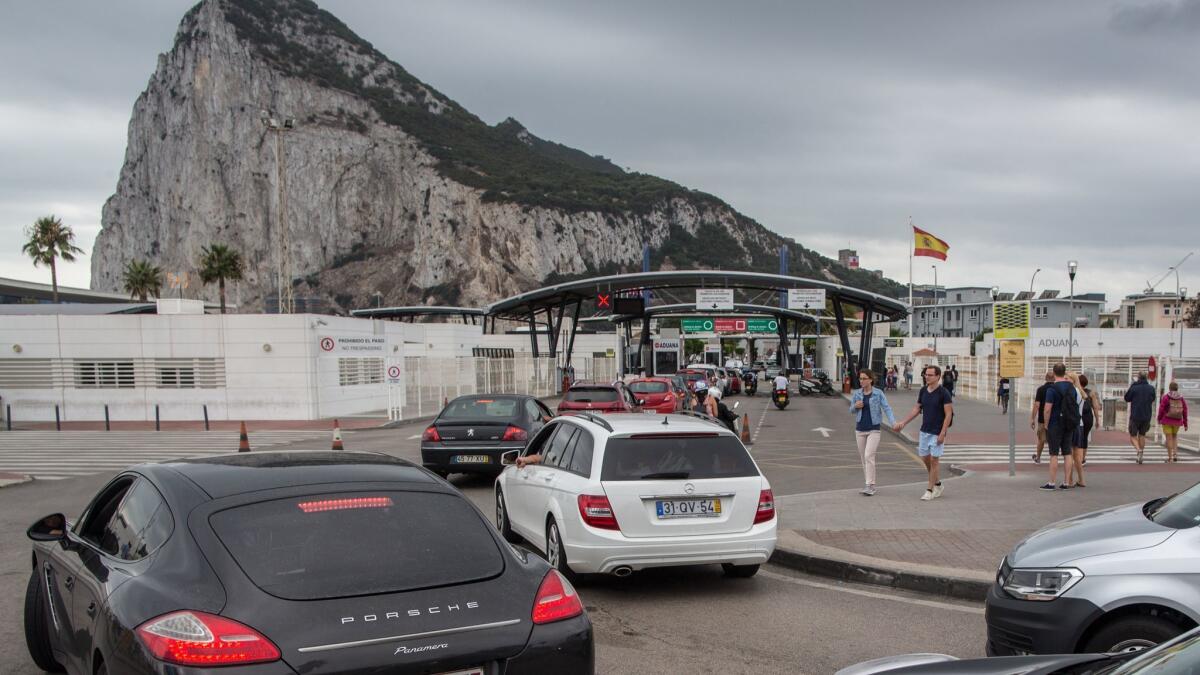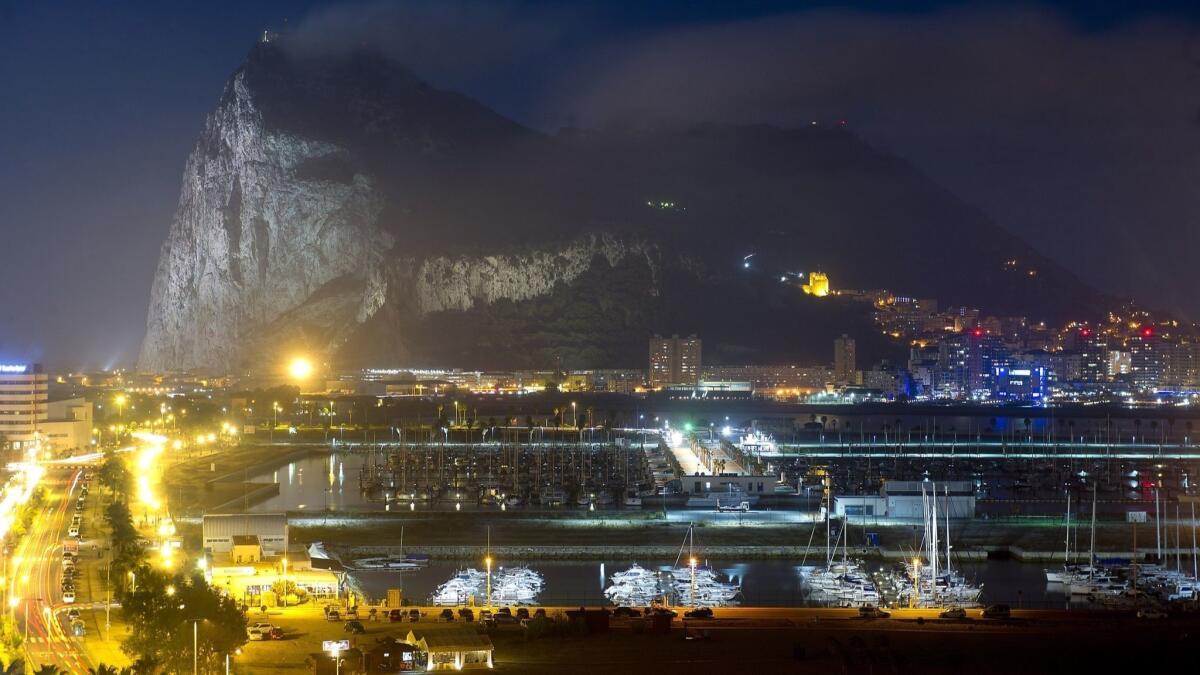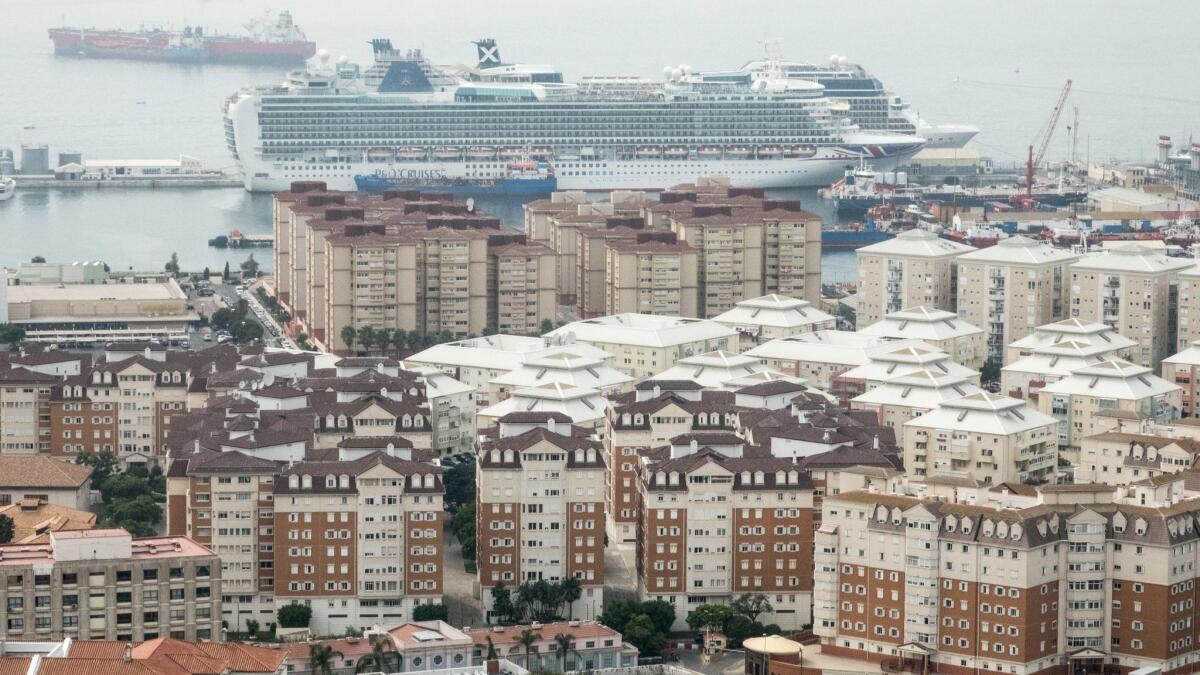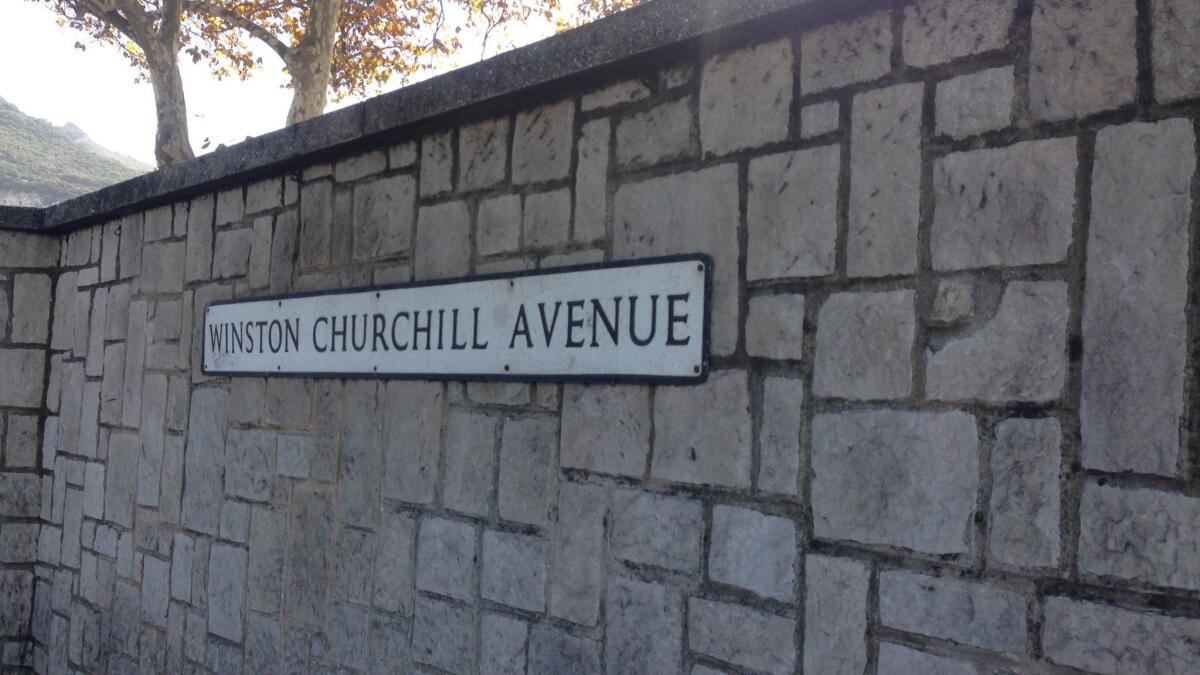As ‘Brexit’ looms, Spain aims to take greater control over Gibraltar

- Share via
Reporting from Gibraltar — When Mariza Llamas was 16, a trip from her home in Gibraltar to the neighboring town of Algeciras, where her relatives lived, took two ferry rides and a stopover on another continent — a full day of traveling.
This was in the 1970s, when tensions between Spain and Gibraltar, the British outpost at the southern edge of the Iberian Peninsula, were at their worst. Spain had long tried to claim Gibraltar, a territory it had lost to Britain in 1713 after the War of the Spanish Succession. In an act of spite toward Britain, Spanish dictator Francisco Franco closed off the border in 1969, forcing thousands of people who normally crossed into Gibraltar for work each day to choose between their jobs and their families in Spain — and splitting up relatives who lived on either side.
Every Sunday, Llamas remembers, families would rush to the border, separated by two fences and a 325-foot stretch of no-man’s land, to yell messages to one another, desperately trying to communicate about a newborn grandson, a death in the family, or just to say hello. One man, Manuel Marquez, jumped the border fence so he could attend the funeral of his father, who’d died while the border was shut down.
“It was very sad, everybody shouting and waving,” Llamas said. “It was a very sad time.”
In Llamas’ case, her great-uncle was ill, and her mother, who was born in the Spanish town of Algeciras but lived in Gibraltar, longed to see him. So twice a year, the family undertook the arduous journey to visit, first catching a ferry from Gibraltar to Morocco, and then another from Morocco to the port in Algeciras. In a car, the trip would have taken 30 minutes.
In 1982, seven years after Franco died, Spain’s new democratic government reopened the border, promising goodwill to the people who lived on this 2½-square-mile speck of land at the doorstep of Europe.
But by then, Gibraltarians fervently identified as British and harbored a deep mistrust of the Spanish government, which, for all its promises, never fully backed off its quest to regain its lost territory.
That fraught relationship — and Spain’s desire to assert more control over Gibraltar — came into sharp relief last week when Spanish Prime Minister Pedro Sanchez announced that Britain’s pending withdrawal from the European Union gave Spain unprecedented authority to intervene in Gibraltar’s affairs with Europe.
He also said the issue of joint British-Spanish sovereignty over Gibraltar was now up for discussion.
“Gibraltar’s relationship with the European Union after Brexit will now have to pass through Spain,” Sanchez said at a news conference in Madrid.
In response, British Prime Minister Theresa May rejected Sanchez’s interpretation of Britain’s withdrawal agreement and argued that joint sovereignty was not negotiable.

The contradictory interpretations of the withdrawal agreement have left residents of the British outpost and the surrounding Spanish region uncertain about which country will truly dominate Gibraltar’s future with Europe.
Gibraltar and the nearby Spanish municipalities, known as the Campo de Gibraltar, are mutually dependent. Every weekday morning, the border zone is a human traffic jam, as 13,000 Spanish workers walk, bike and drive into Gibraltar. Spain is Gibraltar’s second-biggest trading partner after the U.K., according to Edward Macquisten, chief executive of the city’s chamber of commerce.
That mutual dependence was a significant factor in Gibraltar’s resounding rejection of “Brexit.” In the 2016 referendum, 96% of the voters here cast ballots to remain in the EU.
Now, with Britain’s withdrawal on the horizon, questions abound. Will Spanish workers need visas to work in Gibraltar? How can Britain’s government, located on an island 1,500 miles away, navigate Gibraltar’s complex economic reality during trade negotiations?
The biggest fear on both sides of the border, however, is a repetition of history. If the EU does grant Spain greater power to intervene in Gibraltar, will the Spanish government again close the border for political gain?
“We’ve had this fear that what happened in 1969 will happen again today,” said Juan Jose Uceda, a representative of the Assn. of Spanish Workers in Gibraltar who moved to London after Franco closed the border. “We have always had this fear that in any moment we can be covered by the shadow of nationalists.”
Gibraltar, a city of 32,000 people with its own parliament, is an oddity born from a colonial war fought three centuries ago. Just a step away from Spain are streets with names like Winston Churchill Avenue, iconic red London telephone booths, and restaurants advertising British high tea and fish and chips. Gibraltarians — whose ancestors are a mix of British, Spanish, Portuguese, Italian and Maltese — speak with English or Scottish accents in conversations peppered with Spanish words like “vale,” “bueno,” “pero,” and “si.” Feisty Barbary macaques, the only wild monkey species on continental Europe, roam the streets and pester tourists.
Most iconic to Gibraltar is its looming limestone mass that juts into the Atlantic, giving the city its nickname, the Rock. The famous rock makes a cameo in John Lennon and Yoko Ono’s wedding portrait; the two were married in Gibraltar in 1969.
Its citizens pride themselves on strong self-government, modeled on the English system, and identify as British Gibraltarians.
But the city has long been a source of contempt for Spanish politicians. In particular, they denounce the stark economic contrasts between Gibraltar and the Campo de Gibraltar.

Gibraltar boasts a healthy per capita gross domestic product of $110,000 and a growth rate of 6% to 8% each year; La Linea de la Concepcion, a city of 70,000 on the other side of the border, is one of Spain’s poorest. Gibraltar’s level of unemployment is around 1%, while La Linea’s is 35%.
Spanish politicians also describe Gibraltar’s economic practices as unsavory. They argue that the city’s low corporate tax rate and lack of a value-added tax make it a tax haven that attracts a disproportionate number of online gambling companies into its borders. They charge that the port’s at-sea refueling, known as “bunkering,” pollutes Spain’s coastline and reduces potential revenue for its own nearby port at Algeciras. And they chastise Gibraltar for the rampant smuggling of cheap tobacco across the border into Spain, which makes it impossible for Spanish companies to sell tobacco at a competitive price.
Brian Reyes, editor of the local daily the Gibraltar Chronicle, calls such charges “misinformation.”
“Madrid papers like the easy narrative of Gib as tax haven, that they pollute the environment,” said Reyes. “Spain uses it as a political issue.”
Juan Franco, the mayor of La Linea, said politicians in Madrid don’t understand that, far from harming the region, Gibraltar is necessary for La Linea’s survival.
“Gibraltar is practically the base of our economy,” he said.
Sanchez’s rhetoric — and particularly the notion of shared sovereignty over Gibraltar — surprised observers, who normally associate calls to reclaim Gibraltar with the political right, not Sanchez’s socialist party.
Jesus Verdu, a law professor at the University of Cadiz who studies Gibraltar and the surrounding region, called Sanchez’s words “extraordinary.” His rhetoric, Verdun said, seemed like timely political posturing: Andalusia, the province bordering Gibraltar, will hold elections on Sunday, and Sanchez, who governs a fragile coalition in the Spanish parliament, is looking to strengthen his support there.
“Right now, Sanchez has a weak government with a lot of problems. He’s fighting against the right’s interpretation that he is anti-patriotic,” Verdu said. “He wants to play the Gibraltar card to reaffirm his nationalist sentiment.”

Sitting on a coffee shop terrace on Gibraltar’s main cobblestone street before work one morning, Giselle Charlton, 59, and a group of friends began talking about the issue of “joint sovereignty” they saw discussed on Spanish news the night before.
“They don’t need Gibraltar,” said Charlton, who was born here. “I don’t listen to a lot of Spanish TV. Every time we do hear it, we get annoyed.”
Her friend Adrian Traverso, a tour guide, stopped by the terrace to offer his own opinion.
“If you give a donkey a carrot, it will follow. It you hit the donkey with a stick, it won’t,” he said. “We’re the donkey. And we’ve been hit by the stick multiple times.”
Even if Spain is granted greater control over Gibraltar’s affairs, the government will have a hard time persuading residents to approve joint sovereignty. In a 2002 referendum on the issue, 99% of Gibraltar voters were against shared sovereignty with Spain.
Reyes attributes Gibraltarians’ strong sense of identity to a shared historical struggle, from World War II to Franco’s border closure.
During World War II, the Rock’s entire civilian population was evacuated, most to Madeira, Jamaica or London.
Nearly all returned.
“This community’s identity is deeply, deeply, deeply rooted in that rock,” Reyes said. “It is very simple. It means it is my home. It’s where my child grew up. It’s where my parents grew up. It’s where my grandparents grew up. I’m not imported. My roots are here.”
Bernhard is a special correspondent.
More to Read
Sign up for Essential California
The most important California stories and recommendations in your inbox every morning.
You may occasionally receive promotional content from the Los Angeles Times.









